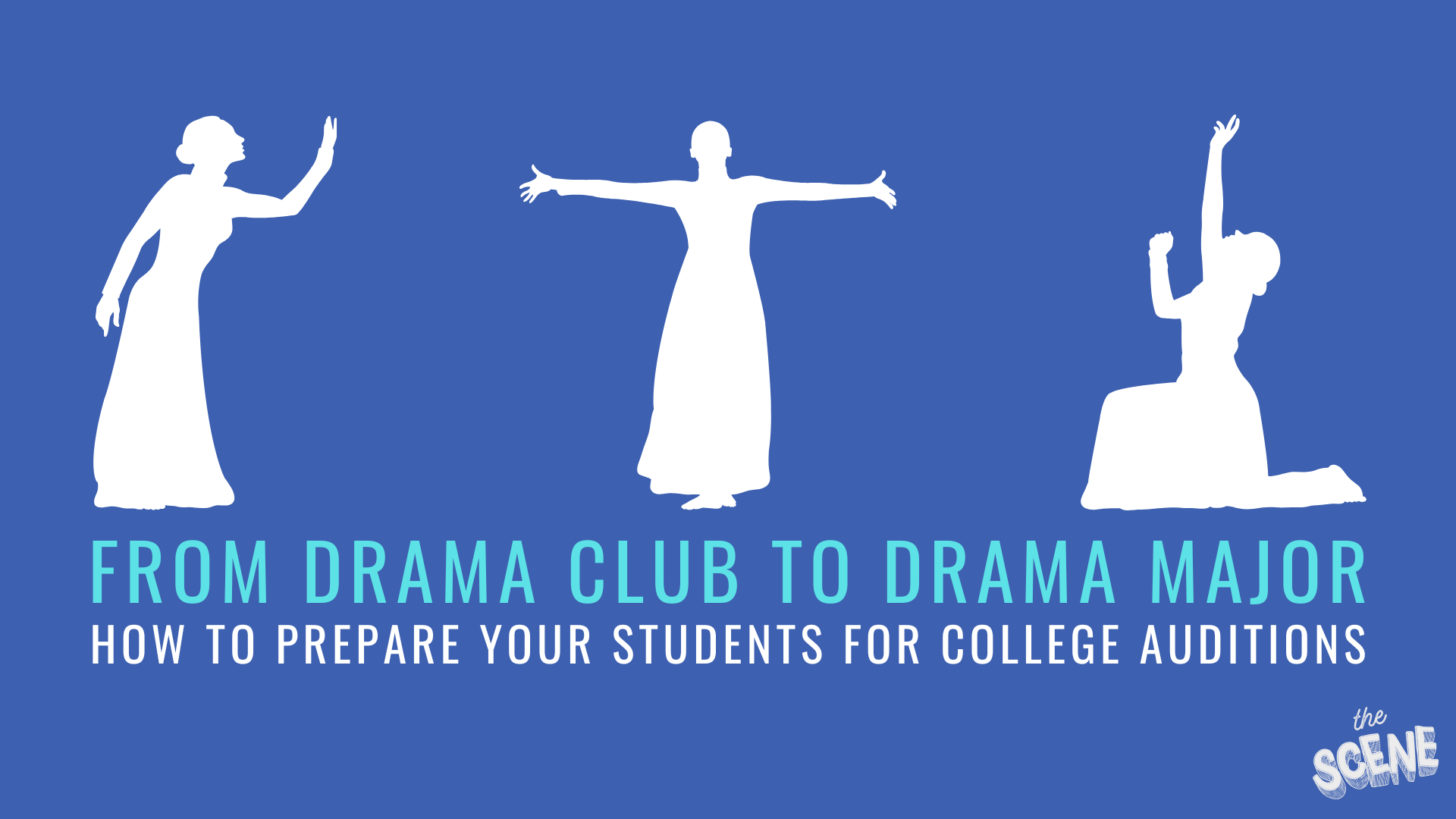by Zach Dulli, The Scene
College auditions are a pivotal opportunity for your students to immerse themselves in four transformative academic and artistic development years. For many teenagers, stepping onto that stage to sing, dance, or deliver a monologue in front of discerning faculty can seem like a terrifying cross between “The Hunger Games” and “America’s Got Talent.” As their trusted theatre educator, you know how to guide them through this critical stage. Instead of getting lost in the pressure, you can focus on a clear plan to help them prepare effectively, manage their nerves, and showcase their unique talents. Think of what follows as your behind-the-scenes action guide, designed to solve common audition pitfalls and give your students the support they need to earn that long-awaited acceptance letter.
Choose Material That Suits Their Strengths—and Their Age
First, you do not want a 17-year-old channeling the heartbreak of a twice-divorced 50-something. Casting directors at college programs want to see authenticity; they crave a performance that comes across as genuine and personal. Help your students gig for monologues that suit their actual life experience. That doesn’t mean they have to pick a piece from High School Musical, but it does mean they should avoid roles that stretch believability past its snapping point.
Teach Them to Embrace Their Inner Nerd: Research the Programs
Before your students wave their arms around in a soulful soliloquy, they need to know precisely which programs they’re applying to—and what each program values. Some are all about method acting, while others will have them belting show tunes till dawn. Have your students make a list of their top choices and investigate typical acceptance rates, program philosophies, and audition styles. What shows did the school produce this season? How many performance opportunities will they have each school year? Show them how to tailor their approach to each school. Encourage them to watch videos and webinars or attend open houses if possible. The more they see, the more they’ll refine their audition strategy.
Create a Solid Rehearsal Process—No One’s a Slacker Here
That old cliché—“practice makes perfect”—applies doubly to theatre auditions. But random, half-hearted run-throughs do more harm than good. The key is a structured rehearsal process. Schedule regular rehearsal times specifically for audition pieces. Encourage—and, dare we say, require—that they break down each monologue: who is their character, what do they want, what’s the conflict, what’s the emotional arc? Then, set up a mock audition day. Have each student perform in front of a small group of fellow theatre educators or even local professionals, then share notes in a supportive, constructive environment. It’s the best way to replicate the high-pressure vibe of the big day.
Wardrobe Woes Be Gone: Dress the Part
No one wants the kid who shows up in a ratty T-shirt with “I Heart Theater” scribbled in Sharpie. But it’s equally disastrous to have them don sequined top hats and full Mamma Rose regalia. Advise them on comfortable, neat, and form-fitting attire that lets them move without distraction. The focus should be on their performance, not an awkward costume piece. Suggest neutral tones. Avoid bold patterns or brand logos that could draw an auditor’s eye for all the wrong reasons.
Voice and Body Warm-Ups: The Unsung Heroes
A sprinter wouldn’t run the 100-meter dash without stretching, right? In theatre, warming up is mandatory. For many students, nerves alone can lock up the vocal cords and turn “To be or not to be” into “huh-blah-blah.” Teach them a reliable warm-up routine—tongue twisters, breath control exercises, gentle stretching for muscles, and deep breathing. Make it second nature. Remind them that every performer from Broadway to Hollywood invests time in a complete warm-up. It’s not just for novices; it’s for pros.
Coach Them on Confidence (and Humility)
Yes, they need to be bold but not arrogant. Confident yet approachable. It’s the ultimate balance. Auditors can smell desperation or narcissism from a mile away, so strike that middle ground. Provide positive, honest feedback. If something’s off, say it. But also highlight what they’re doing well—confidence built on real skill is the best currency at the audition table. Encourage them to walk into the room with a smile and treat it like a professional gig. It’s a courtesy to the auditors and sets the tone for how they’ll be remembered.
Master the Resume and Headshot Hustle
A polished resume and a professional headshot signal that a student is taking their craft seriously. Auditors glance at these materials first, so make them shine. Show them sample resumes that follow the standard actor format—name, contact info, relevant experience, training, and special skills. Keep it to one page. If possible, have them invest in professional photography or at least guide them to someone who understands theatre headshots (no glam filters, please) and make sure it looks like them today, not them in last summer’s beach photo.
Have Them Embrace Their Quirks: Special Skills Galore
College programs love a standout skill. Whether your student can juggle or belt out an E♭ that could wake the neighbors, those distinct talents can help them shine. Encourage your students to be honest about their talents on resumes and in auditions. If they have special dance, improv, or comedic abilities, that’s golden. Whatever special skill they have, don’t list it if they’re not ready to show it off.
Help Them Develop Audition Etiquette
Sometimes, it’s the simple things that trip performers up. It’s not enough to nail the monologue; students also need to navigate the unwritten rules of the audition process. Teach them to greet auditors politely, hand over their resume and headshot properly, and exit gracefully. Make them repeat the lines: “Hello, my name is… I’ll be performing…” And please remind them to keep their phone off. Not silent, not vibrate—off. A mid-monologue musical ringtone is the theatre equivalent of a Greek tragedy.
Encourage Mental Health and Stress Management
Last but not least, the pressure can be intense. College auditions often coincide with academic stress, extracurricular obligations, and—no surprise—teenage drama. Be a source of comfort and support. Remind students to stay hydrated, eat well, and sleep—yes, actually sleep. You might also introduce a few mindfulness or relaxation exercises before auditions. Let them know that rejections are part of the journey. Even the best, most famous actors have had cringe-worthy auditions in the past. It’s how they learned and how your students will, too.
Final Curtain Call
High school theatre teachers—never doubt your vital role in your students’ futures. You’re the director, the life coach, and occasionally the behind-the-scenes stage crew. With a thoughtful selection of material, rigorous rehearsal, professional polish, and a heavy dose of moral support, you’ll give your rising stars the best shot at dazzling those college admission panels. So, keep the drama on stage, the critiques constructive, and the confidence unwavering. Get your students into that audition room ready to prove they’re not just another hopeful face in the crowd. Because if they can learn to own that space—sweaty palms and all—they’ll be unstoppable.









